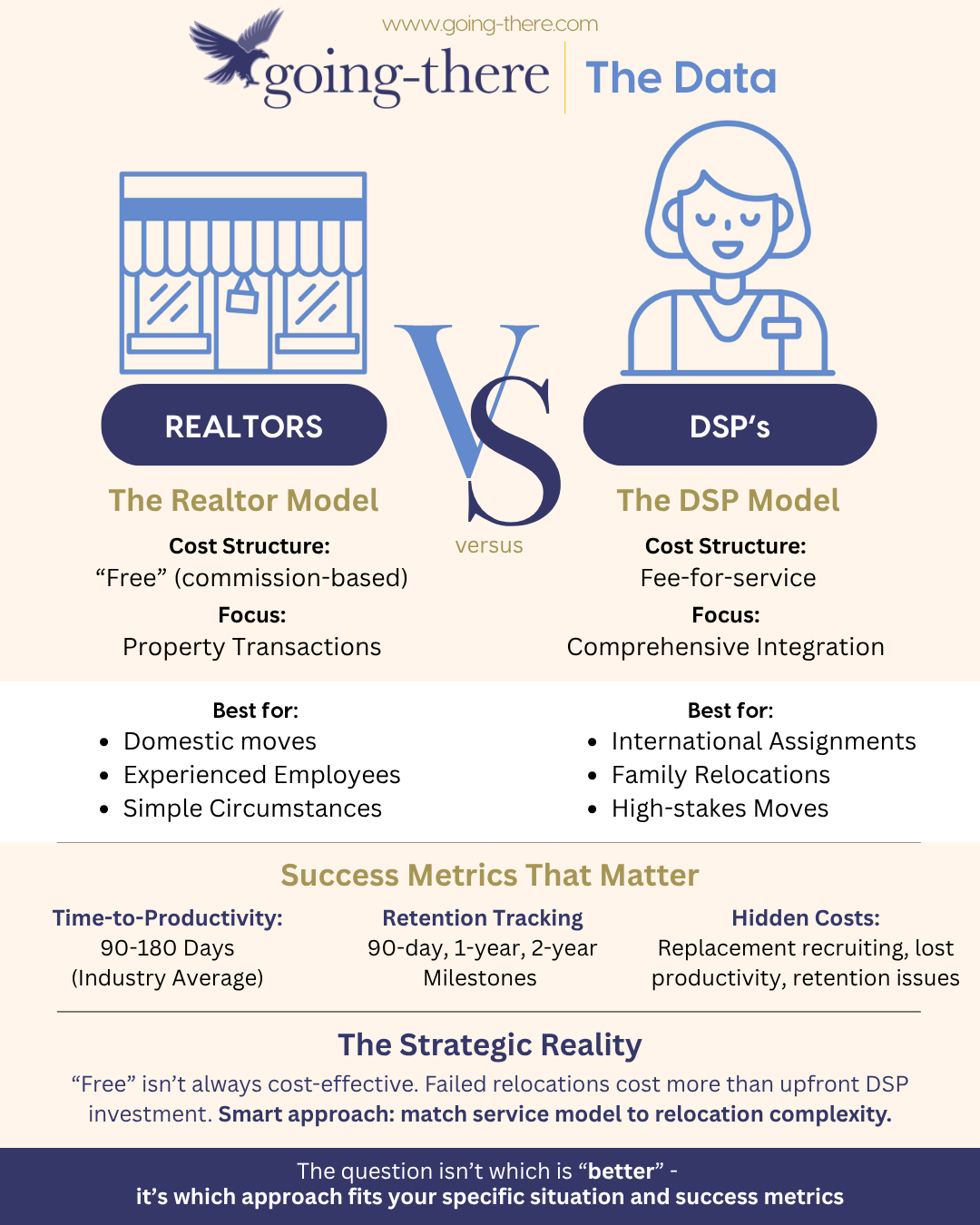Realtors vs DSP.
Posted on 07 Aug 2025 06:00 UTC
Realtors vs. Destination Services: The Strategic Decision That Shapes Employee Relocation Success
Employee relocations have become the lifeblood of modern business growth. Whether you're moving C-suite executives to spearhead international expansion or transferring emerging talent between regional offices, how you support these moves can make or break both employee satisfaction and business outcomes.
But here's the million-dollar question HR leaders face daily: Should you stick with the tried-and-true realtor model that appears "free" on paper, or invest in comprehensive Destination Services Providers (DSPs) that cost upfront but deliver holistic support?
This isn't just about finding housing—it's about setting employees up for long-term success in their new locations.
The Tale of Two Approaches
The Realtor Route: Familiar Territory with Clear Benefits
Traditional realtors have been the backbone of corporate relocations for decades, and there's good reason for their staying power:
The "Free" Appeal: Since property owners typically cover realtor commissions, services appear cost-neutral to your organization. Finance teams love this model because there's no line item in the relocation budget.
Local Market Mastery: Established realtors know their territories inside and out. They understand which neighborhoods have the best schools, shortest commutes, and strongest property values. This expertise helps employees avoid costly mistakes and discover opportunities they'd never find on their own.
Transaction Expertise: Real estate deals involve complex legal documentation and regulatory requirements. Experienced realtors navigate these waters daily, providing invaluable guidance to employees who may be unfamiliar with local practices.
The Destination Services Model: Beyond the Transaction
DSPs represent a fundamentally different philosophy—one that prioritizes successful employee integration over pure transactional efficiency:
True Employee Advocacy: DSPs work exclusively for your employee's benefit, with no conflicting financial incentives from property owners. Their recommendations are based purely on what's best for successful integration, not what's most convenient to close.
The Full Integration Picture: While realtors focus on housing, DSPs handle everything that makes a move successful: school enrollment, healthcare navigation, banking setup, driver's license transfers, cultural orientation, and ongoing support. They understand that finding a house is just the beginning of a successful relocation.
Global Consistency: Established DSPs maintain standardized service levels across diverse markets. Whether you're moving someone from Chicago to London or Dallas to Singapore, the quality and scope of support remains consistent.
Strategic Planning from Day One: DSPs begin with comprehensive needs assessments, understanding family dynamics, lifestyle preferences, and career requirements before even starting the property search. This upfront investment often eliminates weeks of wasted time and dramatically improves outcomes.
When Each Approach Makes Strategic Sense
Realtors Are Your Best Bet When:
- Straightforward domestic moves: Experienced employees relocating within familiar markets where they understand the process
- Strong existing relationships: You have proven realtor partnerships in key markets with track records of success
- Budget constraints: Limited resources require a lean, transaction-focused approach
- Simple circumstances: Single employees without complex family considerations or special needs
DSPs Become Strategic Necessities When:
- International assignments: Cross-border moves involving cultural integration, foreign legal requirements, and complex immigration processes
- Family-centric relocations: Moves involving school-age children, special healthcare needs, or complex family dynamics
- Group relocations: Multiple employees moving simultaneously require consistent service delivery
- Unfamiliar markets: Entering new territories where you lack established relationships or local knowledge
- High-stakes moves: Critical relocations involving key executives or specialized talent where failure carries significant organizational cost
The Real Cost Equation
Here's where the "free" realtor model gets complicated. Yes, DSPs require upfront investment—typically one to eight days of professional services depending on complexity. But what's the true cost of a failed relocation?
Consider the hidden expenses: replacement recruiting, training new hires, lost productivity during extended transition periods, and potential damage to your employer brand. When employees struggle with relocation challenges, their performance suffers, satisfaction plummets, and retention becomes a question mark.
Smart organizations are shifting their metrics beyond simple housing placement to include measurable success indicators:
Key Relocation Success Metrics:
- Time-to-productivity: Track how quickly relocated employees reach full performance benchmarks (industry average: 90-180 days)
- Retention rates: Monitor turnover at 90-day, 1-year, and 2-year milestones compared to non-relocated employees
- Employee satisfaction scores: Use surveys and Net Promoter Scores to gauge relocation experience quality
- Integration speed: Measure cultural adaptation and engagement levels in the new location
- Productivity comparisons: Compare output levels of relocated employees against peer groups
- Cost-per-successful-integration: Calculate total program costs against employees who successfully integrate long-term
When measured against these comprehensive success indicators, DSP services often deliver superior ROI despite their upfront costs.
Building Your Strategic Framework
The most successful relocation programs don't choose between realtors and DSPs—they develop strategic frameworks that match the right service approach to each situation's unique requirements.
Consider developing decision criteria around:
- Destination complexity and your organization's familiarity with the market
- Employee and family circumstances
- Strategic importance of the specific relocation
- Budget parameters and cost sensitivity
- Timeline requirements and flexibility needs
- Cultural and integration support requirements
The Bottom Line for HR Leaders
Both realtors and DSPs serve important roles in the relocation ecosystem. Realtors excel at property transactions within established markets, while DSPs provide comprehensive support for successful employee integration.
When budget constraints are paramount and relocation needs are straightforward, realtor relationships may be perfectly adequate. However, when you consider the total impact on employee satisfaction, integration success, and long-term program outcomes, comprehensive DSP services often deliver superior value that justifies their investment.
The key is building relationships with both provider types and establishing clear criteria for when each approach is most appropriate. Your goal isn't to choose sides—it's to ensure every relocating employee has the right level of support to not just survive their move, but truly thrive in their new location.
After all, successful relocations aren't just about finding a place to live—they're about building the foundation for continued employee success and business growth.
Curious about optimizing your relocation program? Let's discuss how Destination Services can transform your employee experience and program outcomes.
 Tyler Burns
Tyler Burns
Senior Vice President, Global Market Development
Going-there Global Destination Services
Mobile: +1 724-312-0740 (CST)
Email: tyler.burns@going-there.com
Web: www.going-there.com
Did you know...?
With Going-there you'll only ever deal with us; we never sub-contract and we always utilise our own specially-trained consultants on the ground.
For a DIY relocation experience, speak to us about GT2go as a stand-alone solution.

Used on its own or in addition to an in-person orientation, our in-depth, interactive city guides offer detailed information on all of the areas covered by our programmes.
Click here for a list of all GT locations »

Used on its own or in addition to an in-person
orientation. Our in-depth, interactive city guides
offer detailed information on all of the areas
covered by our tours.
Click here for a list of all GT locations »
Contact us
EUROPEAN OFFICE:
York House,
1 Seagrave Road,
London SW6 1RP,
England
Tel: +44 (0) 20 8648 2302
info@going-there.com
NORTH AMERICAN OFFICES:
Houston: